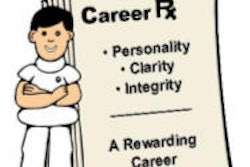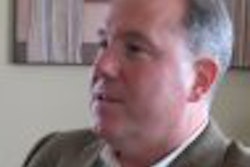AuntMinnie.com is pleased to present part III of an ongoing series on how to survive, grow, and profit from a satisfying career in healthcare informatics by Dan T. Erler of executive-search firm The Howard Group. This article completes stage one of 12 in the Job Discovery Wheel as outlined in the first article of the series.
When I recently learned 80% of people die in the hospital, the statistic surprised me a bit. I also reflected on how many healthcare and informatics careers die in the workplace, so in this segment we are going to examine how to recognize if you have outlived your stay from both the performance and heart perspectives.
The best way to know if something is going awry in your career is to look at what happened at 5 a.m. this morning when: Your opportunity clock did not chime; in its stead, the alarm clock rang. Slowly your mantra changes from "You get to go to work" to "You have to go to work." As you arrive at work, you sense you are speaking a new language. Passion for what you do and the positive expectations for the day are replaced with chagrin and a sense that your grief-to-earnings ratio is out of whack. Something has blindsided you -- let's look into that blind spot.
The blind spot
You're driving along, enjoying the view. As you flip your turn signal and mosey into the next lane, you suddenly hear the blaring horn of another vehicle. A slight panic ensues as you scurry back into your lane. Your blind spot has exposed you!
Safely back in your lane, your heart rate slows as the mystery vehicle begins to pass. You wave a meek "I'm sorry" in the direction of the passing car. Before eye contact occurs, road rage sends an uncomplimentary hand gesture in your direction. An internal alarm goes off as you unconsciously prime yourself to unload 40 rounds of autoresponse. Your first inclination may be, "That so-and-so, I had my signal on." You want to transfer the full blame -- or at least some of it. It doesn't work. Five seconds after you respond, in like manner, you recognize a minister. No, worse -- your minister is the joint offender.
Careers have blind spots, too. Many careers suffer as people fail to adjust their mirrors to cover the blind spots. They blast ahead and change lanes while expecting everyone to get out of the way, or face the wrath of their well-scripted 40 rounds of autoresponse.
People often work too hard (to escape, to avoid, to cover up, to make money, to impress), tuning out everything and everyone -- even themselves. Pausing at times to take a casual peek, but avoiding direct eye contact in the mirror of life long enough to take an in-depth look. Is ignorance bliss? Probably not.
Adjusting the mirror
A client of mine once said: "Some people's careers seem to take off while others appear to falter. What do you see as the reasons for some careers progressing more slowly then others?" In that moment, I began to realize that many people have not adjusted their career mirrors to cover the blind spots and reduce, mitigate, or retard the negative autoresponse mechanism.
From entry level to executives, fundamental career-related truths exist. Having been on both sides of the employment cycle, the following blind spots came to mind. These are the potential blind spots at which to point your career mirrors. Individuals at any career level may exhibit any of the behaviors from the first list below:
- Getting lazy and simply stopping to work hard enough
- Working on the wrong tasks and at the wrong time
- Acting before having enough information or direction
- Failing to learn to delegate
- Working day to day and on the fly instead of setting goals, plans, and objectives
- Getting wrapped up in the busy work and not making time to learn new things, so getting out of date with the job, technology, new procedures, new environment, or worse -- their careers
- Failing to learn about people, so making contacts with others incorrectly (autoresponse)
- Approaching issues emotionally rather than objectively
- Losing the passion for what they do and simply starting to shut down
- Working at the exclusion of everything and everyone else, and losing balance in life
Over the years, I have had the pleasure of working with many top executives -- the best ones think differently. Successful professionals adjust or readjust their mirrors frequently. They posses most of the following from the second list in abundance:
- They ignored conventional limitations and were rarely satisfied where they were; they wanted uniqueness.
- They had written goals and measured their own behavior.
- They learned to deal with their own anxiety toward their own behavior.
- They visualized their goals and moved toward them consistently and confidently.
- They avoided comfort zones.
- They lived in the present and planned for the future.
- They learn how to step outside of themselves and see value in others.
- They developed an uncanny sense of perspective and were rarely caught by surprise.
A major way for you to minimize outliving your stay in your present company or present position is to work at keeping the skill sets from the second list in your sights, while frequently adjusting your mirrors to minimize the blind side activities relating to the first list. Staying on the first list is a choice, as is developing skills of the second list.
Taking care of your career is imperative. Your career is an entity unto itself. It can get sick. It needs a system to operate smoothly. It needs nourishment (your input -- remember, garbage in and garbage out) and yes, sometimes all you can do does not seem to be enough. You occasionally feel like you are on a deserted island where your only input comes from a message in a bottle sent to no one.
Sometimes going it alone is hard. You can make all your own decisions and, because of lack of experience (at any career level), your career is pulled into a black hole or unknowingly you start the process of creating your own hole. The theory of holes states, "If you're in one -- stop digging." Do not dispel the idea of career counseling (at any point in your career) or seeking a mentor or group of mentors.
Enter the mentor
In the last article, I wrote about becoming a change agent. This is someone who tactfully, expertly, becomes the heartbeat of the group, and through personal dynamics and hard work, changes the culture. At all levels of the organization -- from the top, middle, or bottom -- change agents pull people along with them.
People who are in the early stages of a career need help such as mentoring, as does a newly appointed CEO. Grooming, performance, behavior, approaching people correctly, planning, goal-setting, achieving goals, dealing with difficult people, negotiation, understanding financial metrics, managing an expense account, or deciding if you should accept a promotion are a few of the career-related elements that must, as the Wicked Witch of the West said, "be handled delicately."
People who like you, your efforts, and the quality of your output can all be mentors by being sponsors of your activities. Your best mentor may be a collection of advocates who recommend you as a person of quality they would enjoy working with over and over again. Mentors can be your customers, patients, users, references, peers, or supervisors.
Generally speaking, if you are looking for a single-source mortal mentor (and you should not), your mentor should be someone other than your boss. Boss mentors create the illusion to peers that you are a favorite or especially well-connected.
Good mentors, like good change agents, improve their "stock" in the organization and the sector they serve, resulting in an increase in their market value. How you find one and approach one is another topic in itself. The fact that you may need one for many of the cycles throughout your career is something you need to consider. I will say this: A mentor does not need to be in your company, field, or city. Coaches can be excellent mentors as long as the agreement is clear as to what you want and need from them to help you accomplish your career plan. Their expertise must be in line with the expertise you seek.
It's a wrap
I trust the two lists serve as a tool for you to do that mirror check. Remember, being blindsided is both inevitable and a choice. New levels of inexperience occur at any career level. It is what you do when your blind side is exposed that defines you. In the next two articles of the series, we will enter the purpose phase of the Job Discovery Wheel, and begin by examining how to make you desirable internally or externally. We will begin to examine performance metrics and discuss how to work the corporate heart (return on investment) to your advantage.
By Dan T. Erler
AuntMinnie.com contributing writer
October 4, 2006
Erler is an executive recruiter and director of healthcare informatics for the Overland Park, KS-based executive search firm The Howard Group. He attended the U.S. Naval Academy, chased submarines, served as a "cultural expressions" instructor, hosted a talk-radio show focusing on senior healthcare, and has worked with the Salvation Army as a board member. He is also author of the forthcoming book, The Job Discovery Wheel -- A Career Journey From Awareness to a Bright Future, scheduled for publication in 2007.
Related Reading
Are you considering changing jobs for the right reason? September 13, 2006
My career in healthcare informatics: Is it still right for me? August 16, 2006
PACS administrator certification efforts heat up, June 20, 2006
Technologists take advantage of 3D opportunity, March 25, 2006
PACS administrator role requires planning, vigilance, March 11, 2005
Copyright © 2006 Dan Erler



















